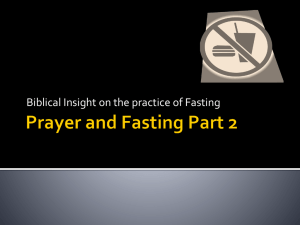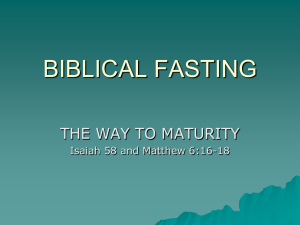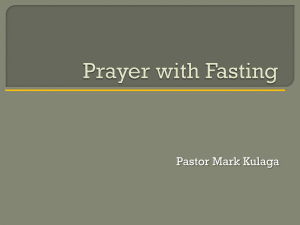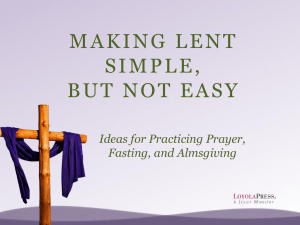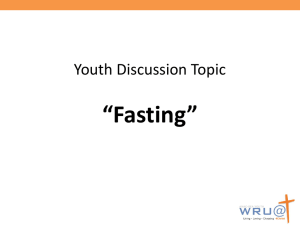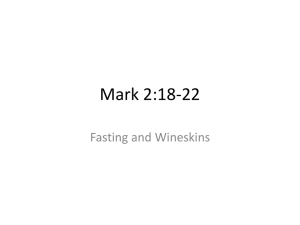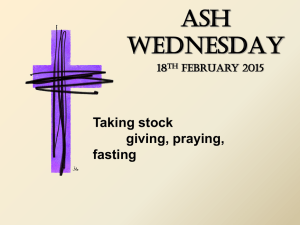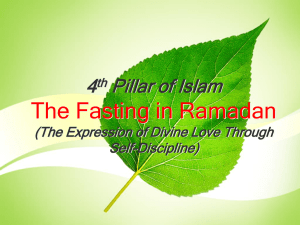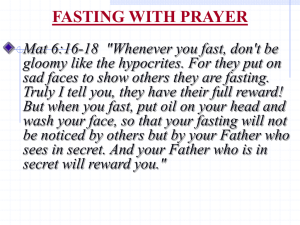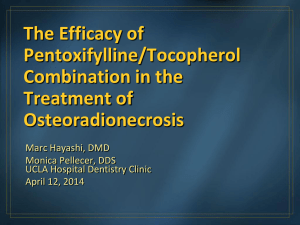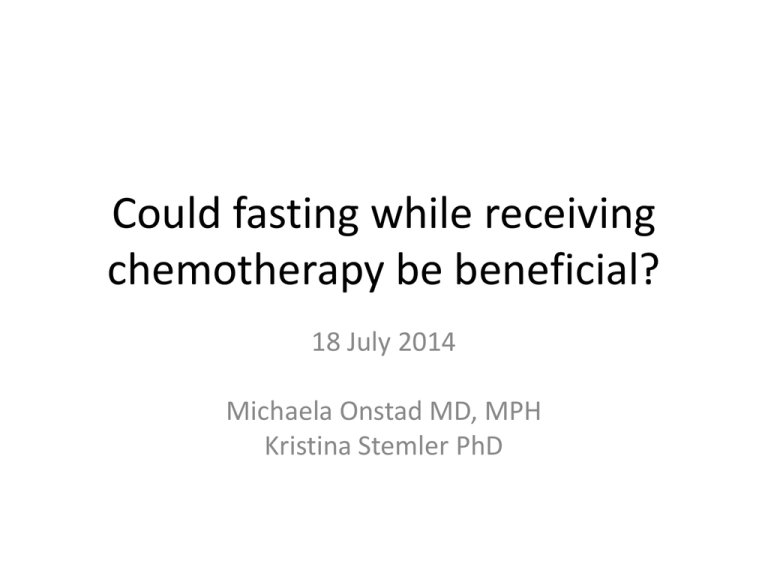
Could fasting while receiving
chemotherapy be beneficial?
18 July 2014
Michaela Onstad MD, MPH
Kristina Stemler PhD
Starvation-dependent differential stress
resistance protects normal but not
cancer cells against high-dose
chemotherapy
Lizzia Raffaghello, Changhan Lee, Fernando M. Safdie,
Min Wei, Federica Madia, Giovanna Bianchi,
and Valter D. Longo
PNAS 2008
Quick Summary
• Aim – Constitutively active oncogenes prevent
effective differential stress resistance
• Methods
– Stress yeast, primary cancer cell lines with H2O2
and chemo after STS
– Stress cancer-bearing mice and controls with
chemo after STS
• Results (to come)
• Where is the field now?
Differential stress resistance against
oxidants and genotoxins in yeast
In vitro DSR to H2O2 treatment
Rat glioma cell line
Human glioma cell line
Human neuroblastoma cell line
In vitro DSR to cyclophosphamide
treatment
Human glioma cell line
Human
neuroblastoma
cell line
CP treatment (15 mg/ml)
Short-term starvation protects against high
dose etoposide, in vivo
DSR in cancer-bearing mice
Model for DSR in response to STS
Effect of diet on serum IGF-1 in murine
models
Brandhorst et al., Exp Gerontology 2013
Fontana et al., Science 2010
Fontana et al., Science 2010
Fasting and cancer treatment in humans:
A case series report
Fernando M. Safdie, Tanya Dorff, David Quinn, Luigi
Fontana, Min Wei, Changan Lee, Pinchas Cohen,
and Valter D. Longo
Aging 2009
Quick Summary
• Aim- Determine feasibility and effect of fasting in cancer
patients undergoing chemotherapy
• Methods
–
–
–
–
–
Descriptive case series
10 patients with different malignancies
Voluntary fasting during chemotherapy
Reported side-effects
Effects on tumor volume, serum tumor markers
• Results
– Fasting was well tolerated
– Fasting was associated with reduced fatigue, weakness and GI
side effects
– No adverse effects on tumor volume or serum tumor markers
Cases
Fasting Regimens
• Varied in length
– 48-140 hours prior to chemotherapy
– 5-56 hours following chemotherapy
• What was consumed during fasting was not
well defined for most patients
• Diet during non-fasting chemotherapy cycles
was not described
Measurement of Side Effects
Measurement of Side Effects
Other Reported Effects
• Complete blood count
– Absolute neutrophil count
– Hemoglobin
– Platelets
• Tumor markers
• Tumor size on imaging studies
Adverse Effects of Fasting
• No specific survey described to detect adverse
side effects of fasting
– “Minor complaints that arose during fasting included
dizziness, hunger, and headaches at a level that did
not interfere with daily activities”
• Weight loss
– “Weight lost during fasting was rapidly recovered in
most of the patients and did not lead to any
detectable harm”
• Other measures of nutritional status?
Conclusions
• Fasting was well tolerated
• Self-reported reduction in chemotherapyinduced side effects
• Fasting did not prevent chemotherapyinduced reduction of tumor volume or tumor
markers
Current trials
• Mayo Clinic (NCI)
– All cancer types, goal recruitment 12 patients
– Fast 24 hours before day 1 of course 2 of chemo. If
well tolerated, escalate fasting by 12 hours for each
subsequent course for up to 3 courses in the absence
of unacceptable toxicity
– Evaluate weight changes
– Get a preliminary estimate of the longest fewasible
fasting perod prior to chemo
– Evaluate toxicity profile of chemo during fasting
– Evaluate changes in glucose, insulin, IGF1
Current Trials
• University of Southern California
– Patients with advanced urothelial and pulmonary
malignancies (on gemcitabine, cisplatin)
– Goal 70 patients
– Groups
•
•
•
•
Group I- patients fast for 24 hours prior to chemo
Group II- Fast for 48 hours prior to chemo
Group III- Fast for 72 hours prior to chemo
Group IV- Modified 48 hour fast with minimal caloric intake
– Evaluate toxicity, change in plasma markers
Current Trials
• Charite University, Berlin
– 30 women with breast or ovarian cancer
– Randomized controlled cross-over trial
• Fast for 60-72 hours during the first half of a 4-6 cycle
regimen of chemo or fast for the same time period
during the second half of chemo
– Evaluate QOL using FACT-O
– Evaluate fatigue, intensity of adverse affects, and
laboratory assessments
Further discussion
• What is the real world application, would
patients be amenable?
• Can we utilize fasting induced
chemoprotection in the clinic?
– Weight loss goal or length of time?
• Current standard of care for diet during
chemo?
• Risks related to fasting that should be
considered?

